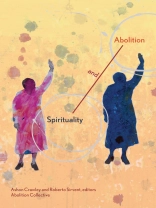Abolition can be a spiritual practice, a spiritual journey, and a spiritual commitment. What does abolition mean and how can we get there as a collective and improvisational project?
To posit the spirituality of abolition, is to consider the ways historical and contemporary movements against slavery, prisons, the wage system, animal and earth exploitation, racialized, gendered, and sexualized violence, and the death penalty necessitate epistemologies that have been foreclosed through violent force by Western thought of philosophical and theological kinds. It is also to claim that the material conditions that will produce abolition are necessarily Black, Indigenous, queer and trans, feminist, and also about disabled and other non-conforming bodies in force and verve.
Abolition and Spirituality asks what can prison abolition teach us about spiritual practice, spiritual journey, spiritual commitment? And, what can these things underscore about the struggle for abolition as a desired manifestation of material change in worlds we inhabit currently? Collecting writings, poetry, and art from thinkers, organizers, and incarcerated people the editors trace the importance of faith and spirit in our ongoing struggle towards abolitionist horizons.
Tabella dei contenuti
Searching For An Abolitionist Spirituality—Jared Ware
The Manual For Liberating Survival: Lesson 1. How self-care matters as an embodied practice of abolition—Rae Leiner and Jasmine Syedullah
Is, Was, and is to Come: Freedom Dreamworld Dispatches—Andrew Krinks
Resurrection at the Fractured Locus: Incarcerated Black Trans Embodiment and Decolonial Abolition Praxis—AK Wright
God is Blackness: Mysticism of the Unowned Earth—Peter Kline
The Abolition of Hell: Abolitionist Interpretations of Jesus’ Descent into Hell—Hannah Bowman
Circa l’autore
Abolition: A Journal of Insurgent Politics is a collectively-run project supporting radical scholarly and activist ideas, poetry, and art, publishing and disseminating work that encourages us to make the impossible possible, to seek transformation well beyond policy changes and toward revolutionary abolitionism.












